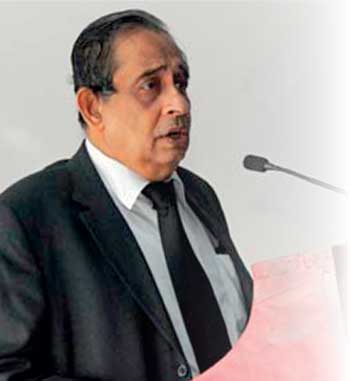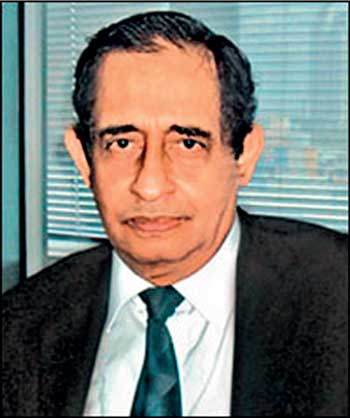‘Sri Lanka is too small to have a Federal state’–Dr. Jayatissa de Costa
Posted on November 6th, 2017
By Kelum Bandara Courtesy The Daily Mirror

President doesn’t seem to be serious about Steering Committee on constitution making
That is why he has decided to call for an All Party Conference
It’s feared whether Parliament will enact new Constitution in
the same way it enacted PC Elections Act
Unitary status and foremost place for Buddhism are unique features of our Constitution
Evangelical Lutheran Religion is the official religion of the state in Norway
Evangelical Lutheran Church is the established Church of Denmark
Why aren’t those advocating secularism here considering
these models?
All Federal countries, barring a very few, are geographically vast countries
Former Principal of Sri Lanka Law College Dr. Jayatissa de Costa, in an interview with , argued that Federalism, under any garb, wasn’t acceptable for a small country like Sri Lanka.
Dr. de Costa, a President’s Counsel, says the entire constitution making process was unconstitutional. Following are excerpts of the interview done with Dr. Costa.
Q: President Maithripala Sirisena has called for an All Party Conference (APC) to initiate a dialogue on the constitution making process. What is your view?
The President is on record calling for an All Party Conference consisting of the political party representatives, and another one comprising religious leaders. There is the third one comprising scholars and professionals. It shows that the President isn’t taking the report of the Interim Committee very seriously. Once again, the President is considering his views independently. There was no substantial discussion on the whole process. Otherwise, there is no reason for the President to call for another conference.

Q: There is a school of thought that the entire constitution making process is unconstitutional. What is your view?
I agree. In Sri Lanka, sovereignty lies with the people. In the Republic of Sri Lanka, sovereignty is in the people, and is inalienable. Sovereignty includes powers. Everything starts from that. People‘s representatives thought it fit to promulgate the 1978 Constitution. That is an offshoot of the first Republican Constitution. That is where we started as an independent sovereign nation. When we attained independence, the first Constitution was a product of the British Parliament. The Ceylon Independence Act was passed by the British Parliament. From 1947 to 1972, we were governed by British sovereign power. Every law was enacted in her name. When I took oath as a lawyer in 1971, it took the oath of allegiance to Elizabeth the Second, the Queen of Ceylon at that time.
Once again, the President is considering his views independently. There was no substantial discussion on the whole process. Otherwise, there is no reason for the President to call for another conference
The first homegrown constitution was promulgated only after 25 years of independence. One can argue that the provisions of the Soulbury Constitution can be used to make the new Constitution. There were no provisions because, over the years, the Supreme Court as well as the then highest court of the country promulgated on a number of occasions that certain Articles of the Soulbury Constitution were unalterable. In other words, the British, when they gave independence, thought it fit to retain some unalterable provisions. So, at the 1970 General Elections, the United National Front gave a firm assurance in their election manifesto that if it were elected to power, all the elected representatives would sit separately as a Constituent Assembly. They did that.

Q: The Government maintains that the Steering Committee came up with proposals only. It says this isn’t a final document. Then, why are you panicking?
There is a catch in it. The Supreme Court clearly said that a two-thirds majority in Parliament and the approval of people by referendum were needed to enact the Provincial Councils Election Act. Suffice it to say that it isn’t the intention of the Legislature to allow the nullification of a Bill and introduce new matters at the committee stage of the debate on the legislation. The former Chief Justice has challenged it. The Supreme Court will pronounce its position. It isn’t the case here. After that, every right thinking citizen has the right to suspect similar moves by the Government in the future. Under the pretext of a discussion paper or whatever, Parliament, sitting as the Constitutional Assembly, too can do it obtaining the two-thirds majority. What is this indecent hurry?
Q: In your view, what is the significance of Sri Lanka to be a unitary state?
According to classification of the Constitution, unitary is the opposite word of Federal. It’s like the sky and the earth. Right throughout, a vast majority of legislators and people have endorsed the unitary nature of our Constitution. If you observe the results of major elections, there are two major political camps. One is led by the UNP, and the other opposed to it. We can leave out the ethnically based political parties in the north and the east for the moment. The 1972 Constitution clearly states that Sri Lanka shall be a unitary state. The same is copied in the 1978 Constitution, a product of the UNP-led group. Article 2 of the 1978 Constitution clearly states that the Republic of Sri Lanka is a unitary state. It has become a basic feature of our Constitution. The 1978 Constitution was promulgated as a result of an election promise to establish the presidential system. J.R. Jayewardene received a mandate to establish the Executive Presidency. Yet, he didn’t receive a mandate to introduce the Promotional Representation System. The unitary nature is one of two unique features in the constitution. The other feature which is also important is the foremost place given to Buddhism.
A vast majority of legislators and people have endorsed the unitary nature of our Constitution. The unitary nature is one of two unique features in the constitution. The other feature which is also important is the foremost place given to Buddhism
Article 9 of the present Constitution states, The Republic of Sri Lanka shall give Buddhism the foremost place, and accordingly it shall be the duty of the state to protect and foster the Buddha Sasana while assuring all religions the rights guaranteed by article 10, 14(I) e.
It’s the Government’s duty to protect and foster the Buddha Sasana. Some people, who call themselves post modernists, question the foremost place given to Buddhism. Those, who advocate such a position, conveniently forget what the Constitution of Norway says. They take the Norwegian Constitution as a model here.
Article 2 of the Norway Constitution states,” Evangelical Lutheran Religion shall remain the official religion of the state.”
The Article 4 of Constitution of Denmark states, The Evangelical Lutheran Church shall be the established church of Denmark, and as such, it shall be supported by the state. In Denmark, it’s supported by the state.
Critics of the foremost place for Buddhism ignore these facts.
It’s the Government’s duty to protect and foster the Buddha Sasana. Some people, who call themselves post modernists, question the foremost place given to Buddhism. Those, who advocate such a position, conveniently forget what the Constitution of Norway says
Q: Tamil National Alliance (TNA) MP M.A. Sumanthiran said Sri Lanka should be a secular state if equal rights are to be guaranteed for all. What is your view?
Why haven’t they read the Constitutions of Denmark and Norway? Why double standards? They take these countries as role models regarding the matters. This is Sri Lanka. We are a free sovereign state.
Q: Why do you see Federalism as dangerous for Sri Lanka?
If you look at the successful Federal countries, all are big countries like Canada, the United States, and Australia. Malaysia is also a Federal country. Islam is the state religion.

Q: But, even small countries such as Switzerland and Belgium have Federal features. What is your response?
Switzerland is an exception. It has built safeguards for four different ethnic groups throughout its history. The majority are German speaking Swiss people. Then, there are French speaking, Italian speaking and a fourth group called Romanists. There are a number of cantons there. Cantons have their own laws and traditions. If a citizen of one canton wants to settle down in another, he has to obtain the approval of that particular canton. Will Jaffna Tamils adhere to such a thing here? It applies to Muslims too. In Colombo, we have already become a minority. In Switzerland, you can’t do it. When it suits them, they refer to it as a model though. You can’t compare the incomparable.
Throughout the history of Sri Lanka, it’s a question of the Mahasanga having advised the rulers. Any attempt to dilute the foremost place for Buddhism is against the fundamental principles of our Constitution.
If a citizen of one canton wants to settle down in another, he has to obtain the approval of that particular canton. Will Jaffna Tamils adhere to such a thing here? It applies to Muslims too. In Colombo, we have already become a minority
Q: Government MP Jayampathi Wickramaratne argued the other day in Parliament that there can be more than one subordinate legislative body in a unitary state. He said that is what was proposed. What is your view?
The framers of the present proposals, debated now, are the ones responsible for the infamous referendum that extended the life of Parliament for another term without an election. The referendum itself was rigged. There was no legal provision in the Act to challenge it then.
Sri Lanka is too small to have a Federal state. All the Federal countries, except a few, are geographically vast. There is no necessity to have a number of governing units.
Chief of the North–East Provincial Council Varatharajah Perumal left the country after declaring Eelam. Northern Province Chief Minister C.V. Wigneswaran said Buddhism couldn’t be given foremost place in his province.
November 6th, 2017 at 3:14 pm
Forcing federalism on a country in a small country such as Sri Lanka is just the means to make another Kosovo out of Sri Lanka, destabilization and eventual taking over her resources and strategic locations.
Given Federalism, Police Powers one can commit a crime in the South and escape to the North which is just couple of hours away and never face prosecution.
Given Federalism and Land Powers, there will be endless border disputes beginning with how to share water.
Given Federalism there will be claims on the 12 Mile Seaboard and the Continental Shelf and any other resources within the 200 Mile Economic Zone. These will fall into the hands of powers inimical for the existence of the rest of Sri Lanka.
Those who advocate Federalism are playing with fire just to satisfy their bloated Norther egos. It will not benefit anybody either in the North or in the South.
November 6th, 2017 at 6:37 pm
How come 1987 RAPE ( 13 A) is not even discussed here ?